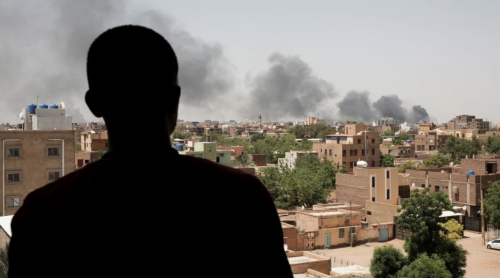

By Isabelle Verduzco
SUDAN — For nearly two months now, war and violence have raged in Sudan. While diplomatic efforts are being made by both the RSF (Rapid Support Forces) and the SAF (Sudanese Armed Forces) at the urging of the U.S. and Saudi Arabia, there is still currently no resolution in sight. Ceasefires that had been agreed upon were not only short, but also sometimes ignored. There is also no sign of either side having an upper-hand and winning the conflict.
The conflict unsurprisingly has had devastating consequences on the civilians in Sudan. Those trapped by the violence in Khartoum are unable to gain access to basic necessities such as food, electricity, and water. Furthermore, hundreds of thousands of civilians have been displaced in addition to the millions already displaced since before the conflict began. The UN has attempted to provide necessities to those caught in the war, but was forced to store the supplies due to the brutalities in the capital. Looting and attacks have also made it difficult to deliver the aid.
According to the regional director of the World Health Organization, Ahmed al-Mandhari, health facilities in Khartoum had been attacked and turned into military bases. The director then told the BBC on May 2nd that, “Up to now there [has been] around 26 reported attacks on healthcare facilities. Some of these attacks resulted in the death of healthcare workers and civilians in these hospitals”
A resident named Omar who is in the capital with his son outlines the suffering they are enduring as a result of being stuck in the crossfire. They are forced to eat one meal a day in order to make use of their scarce resources and, “don’t know what [they’ll do after that] except survive off water and dates.”
It isn’t much better for the civilians who managed to flee either. The UN has calculated that about 100,000 civilians have fled to nearby countries like Chad since the start of the crisis. Unfortunately, the countries the civilians are fleeing to already have a plethora of refugees and are both impoverished and unstable.
The newest nation, South Sudan, which had just recently managed to end a civil war, also saw an influx of refugees since late April. At the time, about 3,000 people had arrived in South Sudan as estimated by the International Organization for Migration. Its economy had taken a massive hit from the war and had led to 400,000 casualties. The IOM pointed out that at least ¾ of its population was already in need of some kind of aid. Still, Peter Van der Auweraert, the South Sudan representative for the migration organization had declared that, “We are preparing for more vulnerable people arriving in the coming days and weeks.”
Although the crisis is mainly concentrated in Khartoum, aggression has also already erupted in other areas such as the Darfur region in Sudan. Consequently, more and more people have fled to the neighboring country Chad – mainly women and children. Those that did manage to leave had to do so with very few belongings and joined other relatives on camps relying on thinning resources.
Faith Kasina, a regional spokeswoman for the UN refugee agency claimed that, “The humanitarian impact of this crisis is going to be almost unimaginable,” and that, “the worst case scenario is unfolding right before our eyes.”
The lack of resources is still not the only issue. The fighting has also led to a sudden rise in tuberculosis cases, though the fighting makes it difficult to record those who have the disease. Today, tuberculosis is killing more people than AIDS or even COVID-19.
Overall, Sudan’s Health Ministry states that more than 500 people have been killed in the fighting and at least 4,000 have been left wounded. The UN Humanitarian Coordinator in Sudan Abdou Dieng stated that “Even before the current crisis, one-third of Sudan’s population, nearly 16 million people, already needed humanitarian aid. Some 3.7 million people were already internally displaced, mostly in Darfur.”
In terms of trapped U.S. citizens who had been warned by the U.S. to leave years prior to the conflict, Secretary of State Anthony J. Blinken said that “dozens” of American citizens have expressed a desire to leave out of the roughly 16,000 situated there. The U.S. is only offering advice because of the danger that evacuation measures would mean.
Still, diplomatic efforts whose goal, according to Undersecretary of State Victoria Nuland is to, “first, [secure an] agreement on a declaration of humanitarian principles and then, [get] a ceasefire that is long enough to facilitate the steady delivery of badly needed services,” remain ongoing. The U.S. has also stated that it is “cautiously optimistic” about securing a truce. She also believes that if it is successful, it would facilitate talks with stakeholders as well as return civilian-led rule.




